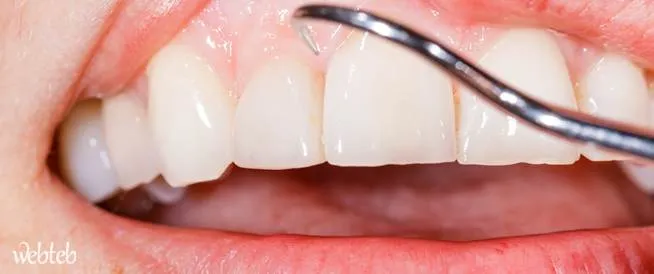Toothache is one of the most common and annoying symptoms that affects many people, and it occurs as a result of several reasons, ranging from tooth decay, gum infections, to problems with the roots of the teeth, as the pain may appear suddenly or gradually, and affect the ability to eat, sleep, and even speak and in this article, we will review the most important causes of toothache, ways to prevent it, and treatments available to relieve this annoying pain.

What are the causes of toothache?
Tooth decay.
Tartar accumulation on teeth.
Gingivitis.
The presence of loose or broken gaskets.
Gum recession.
The appearance of an abscess at the end of the tooth.
Ulcers on the gums.
Sinusitis.
Temporomandibular joint injury.
Broken teeth.
Pain during teething in children.
Symptoms of toothache
Acute or chronic tooth pain.
Teeth sensitivity to touch or pressure.
Swelling of the gums surrounding the affected tooth.
Difficulty chewing or biting.
Increased sensitivity to heat or cold.
The appearance of abscesses or swelling in the gums.
A change in tooth color may indicate pulpitis.
Earache may be related to toothache in some cases.
Feeling pain when eating hot or cold food.
Severe pain that increases at night and decreases relatively during the day.
What is the difference between toothache and gum pain
Differentiating tooth pain from gum pain may require some thought and observation. Here are some differences that can help differentiate them:
Location of pain:
Tooth pain is usually specific and associated with a particular tooth or group of teeth.
As for gum pain, it is often multi-dental and distributed over the surface of the gums in general, without specifying a specific tooth.
Nature and intensity:
Tooth pain is often acute and increases in severity with exposure to stimuli such as pressure, heat, or cold.
Gum pain may be more dull and stiff, and may be accompanied by a feeling of swelling or itching.
Visible signs:
When the cause of the pain is a tooth, signs such as tooth decay, fracture, or swelling of the surrounding gums may appear.
In the case of gum pain, there may be redness or swelling of the gums, and there may be slight bleeding when brushing.
Response to treatment:
Tooth pain usually responds to treatment directed directly at the cause, such as root canal treatment or a dental filling.
Treating gum pain may require good oral and gum hygiene and the use of antiseptic rinses.
However, it may be difficult to determine the exact cause sometimes, so it is always recommended to visit a dentist for an accurate diagnosis and to prescribe appropriate treatment.
Methods of treating toothache
Take painkillers such as paracetamol or ibuprofen.
Use medicinal rinses that contain pain-relieving and anti-inflammatory substances.
Apply cold compresses to the painful side of the face to relieve pain and swelling.
Avoid hot or cold food and sweet drinks.
Maintain oral hygiene by brushing and rinsing your mouth with salt water.
Visit a dentist to evaluate and treat the problem causing the pain, such as tooth decay or gingivitis.
The dentist may perform treatments such as dental fillings, root canals, or root canals, depending on the proper diagnosis.
In cases of very severe pain, emergency medical care may be required, so you should contact your doctor when necessary.
What are the complications of toothache?
Gingivitis: The accumulation of tartar and bacteria around the tooth may lead to gingivitis, causing pain, swelling, and bleeding in the gums.
Radiculitis: If not treated properly, tooth decay may lead to inflammation of the roots, causing severe pain and swelling.
Abscesses: Root inflammation can lead to the formation of abscesses in the gums, which cause severe pain and swelling, and in some cases may require surgical intervention.
Bacterial spread: The infection may spread from an inflamed tooth to nearby tissues in the jaw or even to the blood system, leading to serious complications such as sinusitis or pneumonia.
Headaches and facial pain: Severe toothache may cause facial pain and headaches, and may affect the ability to chew food properly.
Decrease in quality of life: Persistent tooth pain may lead to a decrease in overall quality of life, affecting sleep, daily functioning, and mental health.
These are some common complications of tooth pain, and it is necessary to consult a dentist to provide appropriate treatment and prevent the problem from getting worse.
Ways to prevent toothache
Maintaining healthy teeth and gums is an effective way to prevent toothache, as it contributes to preventing the development of tooth and gum problems that may cause pain and the ways to prevent toothache can include the following:
Avoid consuming sugar-sweetened foods and drinks.
Maintain clean teeth and gums by brushing them regularly twice a day using toothpaste that contains fluoride.
Use dental floss to clean the gaps between teeth.
Visit your dentist regularly to detect tooth and gum problems early.
Use mouthwash to keep the mouth clean and sterilized.
Change the toothbrush regularly every 3 months, teach children how to brush correctly, and visit the dentist periodically to evaluate their oral health.
In short, toothache is an exhausting and annoying pain that must be taken seriously and by maintaining oral and gum hygiene, paying attention to proper nutrition, and regular consultation with a dentist, the risk of tooth pain and its complications can be reduced and by taking good care of your oral health, your teeth and gums can be kept healthy and pain-free.
Related articles :
Hollywood smile in Istanbul
advantages of cosmetic dentistry in Turkey
Plastic surgery in Istanbul
Dental treatment cost in Turkey
advantages of laser teeth whitening in Istanbul
Types and risks of dental implants in Turkey
hair transplant techniques in Istanbul
Dental veneers in Turkey
Hair transplantation in Turkey
Types of orthodontics in Istanbul and their features
